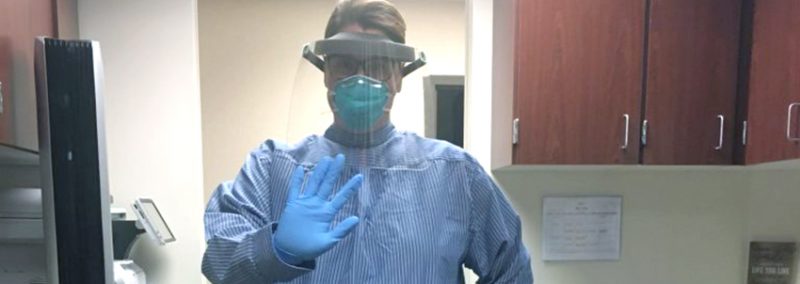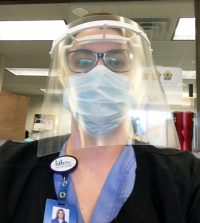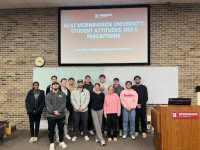Unwilling to gamble her health on the COVID vaccine, a frontline worker in small-town Iowa goes to work every day and deals with burnout and health challenges.
by Elizabeth Obermeier–For Melissa Kruse a typical day starts at 8:00 am: checking messages, making phone calls, and getting patients’ results. By 9:00 am, patients are being roomed, their vitals are being taken, and the phone is still being answered.
Kruse, a certified medical assistant at Horn Physicians Clinic in Ida Grove, is one of several frontline workers putting themselves at risk during the ongoing pandemic.
Melissa’s normal hours are 8:00 – 5:00, but realistically Kruse isn’t off and home until closer to 5:30/6. And in a town with a population of 2,000, the commute only takes about three minutes.
Despite so many things changing during this pandemic, the Kruses’ living situation is something that’s remained consistent throughout. Sure, sometimes if she’s had a particularly bad day where she knows she has been in contact with several COVID positive patients Kruse will come home, take her work clothes off, and shower right away, even before saying hello. Her laundry is also kept and washed separately in these instances.
Melissa’s husband, Troy Kruse, has described the risk of living with someone who could potentially be exposed to the virus while at work as “part of life.” Troy is now triple vaccinated for his safety and his wife’s sake. “You take your precautions and you go to work every day. And you know what? You might get it at the gas station too” said Troy.
On top of keeping things running smoothly in the clinic, Melissa’s duties also include drawing blood, testing for things such as strep and COVID, making sure prescriptions are renewed, counseling patients on their health, and scheduling scans.
While completing any of these tasks, Melissa and the other nurses can always be found wearing surgical masks. And when around COVID patients it’s always an N-95 mask. However, because Melissa is allergic to part of the vaccine and unable to receive it, she is even more cautious than some of her co-workers who have been vaccinated.
“I will go in and I will have the full mask and gloves and gown and the whole bit, you know, I’d rather be safe than sorry.” Melissa is extremely cautious of any symptoms a patient may be experiencing, even a headache, because so many common symptoms are found in COVID cases. This is especially important to someone who is unable to protect themselves with the vaccine.
THE VACCINE
Doctors know Melissa is allergic to the flu vaccine, something she is already unable to receive. They also know certain components such as preservatives that make up the COVID vaccine are similar to the flu shot. Melissa explained there is no guarantee she could have the vaccine and not have any issues, but it’s not something she is willing to gamble on. Melissa did sign a waiver with the clinic stating she was refusing to receive the vaccine and why.
Since Melissa is unable to be vaccinated, it’s critical those around her are. All of her family, including her husband and three children who are in high school and college, have been vaccinated. It’s protecting them, and also their mom.
THE MEDIA
The media likes to create an image of small towns that makes them seem as if nothing bad can happen there, but that is far from the truth. The virus made its way to Ida Grove.
Contrary, over the last almost two years the media has accurately portrayed what the pandemic has been like for healthcare workers. Even on a smaller scale, the problems are the same.
When the pandemic first started, there wasn’t an immediate supply shortage at Melissa’s clinic because they went into lockdown and only saw those who were sick. It was when people began to get vaccinated and wellness checks that they began to see shortages. She explained that the shortages they’re seeing the most are the tubes for drawing blood, masks (N-95 and surgical) and medicine, whether directly related to the pandemic or not.
Burnout, known as being emotionally, physically, and mentally exhausted due to prolonged exhaustion and stress, is another thing that has been inflicted upon the healthcare industry. During this pandemic, burnout is something that Melissa has dealt with personally. She explained that people aren’t as patient anymore. Everything is a lot more demanding, and that wears on her. She gets yelled at daily and sometimes her hands are tied so she isn’t able to do anything about it. When this does happen, the best thing she can do is try and step back, but in a small town where you know everyone that isn’t entirely practical.
THE VIRUS
Melissa had made it COVID-free up until just recently. She found out she had tested positive the morning before Thanksgiving. She was in tears on her way home from the doctor’s office. However, the tears rolling down her face weren’t necessarily out of fear of having the virus, but out of frustration. The Thanksgiving holiday they had planned was no longer going to happen. She wouldn’t be surrounded by her children home from school or sitting down to have a meal that she had worked so hard to prepare.
“It was a major letdown. And then it was also going back… Where did I get it? Where did I let my guard down? You know, what changed?” Melissa expressed.
From the time of testing, Melissa was required to be off work for 10 days. She was also put on antibiotics and steroids for five days for preventative measures.
When discussing her symptoms Melissa said, “It wasn’t bad. The headache was the worst. It was like having a really bad hangover.” She expressed that she was very lucky to not have any respiratory problems.
However, Melissa wasn’t the only one distraught over the news. Her oldest daughter, Lindsey, was heartbroken after hearing of the positive test results. “I was sad because she got COVID and I didn’t want to necessarily be around and exposing myself to it. Especially with finals coming up. So, I ended up spending Thanksgiving here in Sioux City.”
This was even more of a blow for the college junior since she was also unable to spend her Fall Break at home due to her own non-COVID-related illness.
Lindsey also described being worried about her mother while sick because she didn’t know how bad the symptoms were going to be. There have been studies that show adults who are vaccinated tend to have fewer extreme symptoms. And considering Melissa isn’t vaccinated, Lindsey was even more concerned.
THE FUTURE
Since Melissa has had COVID, there have been a few silver linings for the Kruse family. Melissa has expressed that because she has gotten sick already and gotten it out of the way they can for sure have Christmas and the peace of mind that they will be spending the holiday with family. Troy has also come across his own plus-side. Since sleeping in the same bed again, he noticed that Melissa snores a lot less. He joked that it’s actually “bearable” now.
The Kruses realize that the pandemic is not over and there is still a long way to go. Melissa especially knows this as someone in the thick of it every day. “I do wish that everybody would get vaccinated. I think it will help for those of us that can’t get vaccinated.” And until there is a better handle on the pandemic, they will continue to take each and every day as it comes.







Leave a Reply